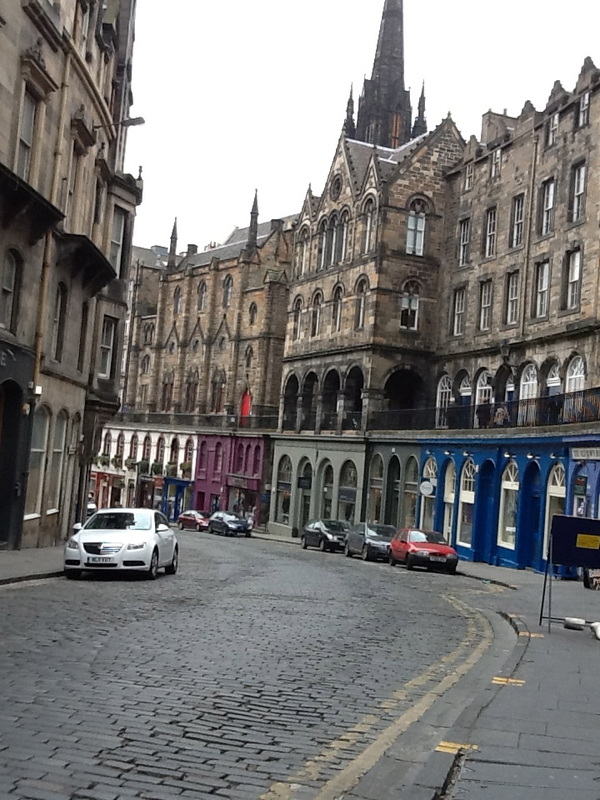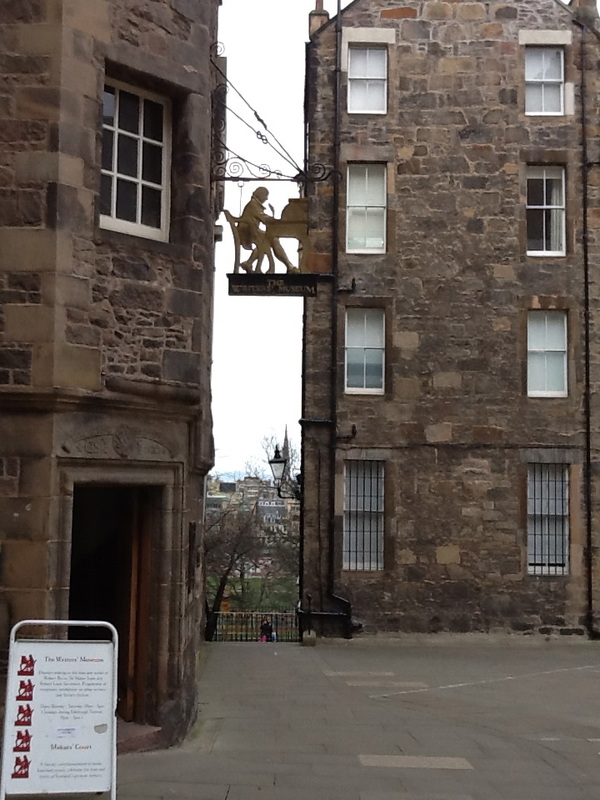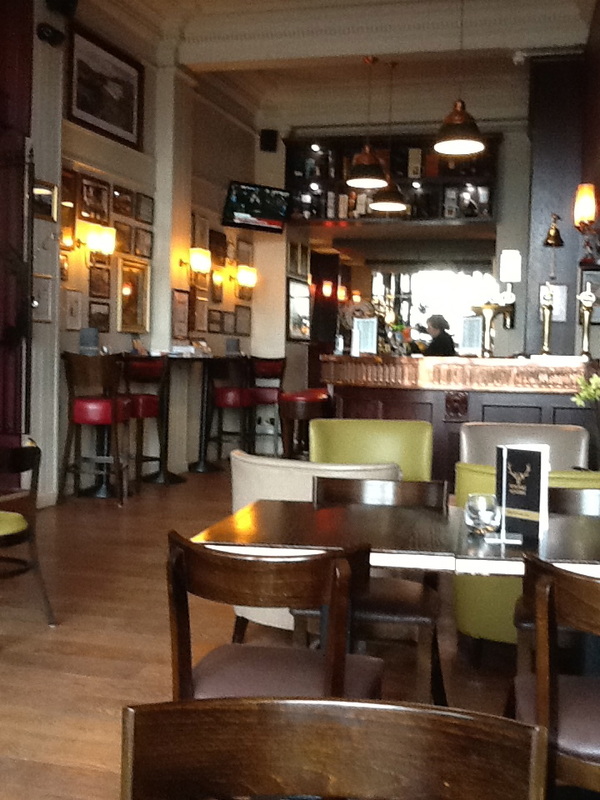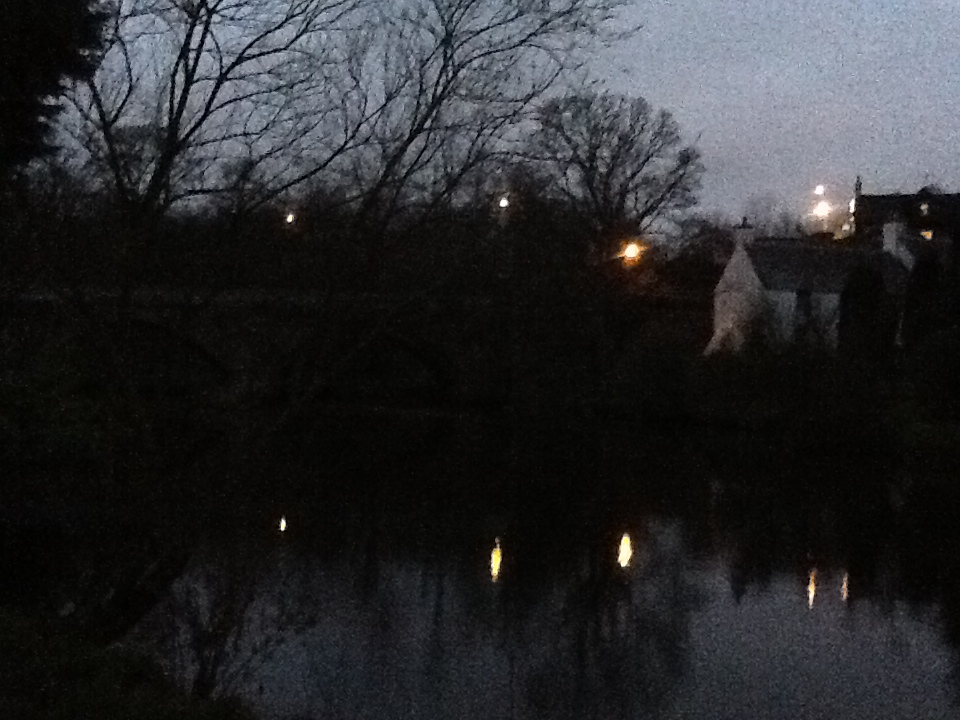In a glass case in the corner is a recent acquisition, a piece of art illustrating a scene from Dr. Jekyll and Mr. Hyde, made from two books, ingeniously cut and glued and inked. Nobody knows who did it.
Up narrow winding stone stairs are rooms dedicated to Robert Burns and Walter Scott. The curator, a very very black woman, said that she was struck by the heavy red paint and wood of the display rooms, the detailed etchings, and the wild primitive scenes that those authors loved to write about.
Salad and sandwich at the Wiski Rooms. The drinking culture is well established here. I could have ordered whiskey for my lunch.
Also, oy the Scottish art! In the basement (why the basement?) are some really amazing examples of Scottish art. There does not seem to be any particular school, but these lesser known works deserve more fanfare. I fell in love with Arthur Melville's "A Cabbage Garden."
Then down and around to the Portrait Gallery, which had some good family portraits of Pakistani immigrants. My love of the absurd was tickled in the library, where there was a case of death masks made by phrenologists. You could see several murderers (who looked like ordinary guys, hmm), two female idiots, a Celtic Type, an English Type, and a Woman of Extreme Cunning. That made me inordinately happy.
Norman fascinated me. He had a rich but not incomprehensible accent, a heavy-lidded face with sagging but still fatty cheeks and lips, and an air of tightly clamped down wisdom. His attitude started out quite sour but despite himself, he became interested and talkative. He may be modeling himself on Robbie Burns, whom he has entirely memorized (says Jelte), and who liked to pass himself off as a simple peasant.
I said that Isa was looking for a bagpipe, and Norman gave a scornful snort. "Ye can't find one for less than a tousand quid, and that's one that'll sound like shite," he said. When he realized that Isa was a woman, he snorted again and turned his chair so that he wouldn't have to face me. I said I would try looking in Greece and Maxwell suggested Bulgaria. Norman couldn't get over the horror of my wanting a bagpipe. It reminded me of the Japanese, who could never quite believe that Camilla and I could use chopsticks and liked fish and rice.
Over several shots of whiskey and a fantastic, starch-heavy meal of kedgeree, rolls, and shortbread, Jelte told a story about when he was little. When he was five, his father explained to him that tomato ketchup is squeezed from the heart of a male lion. Two years later, when his parents moved from Swaziland to Holland, he was disoriented by all those white faces. When his teacher asked the rhetorical question, "Where does tomato ketchup come from?" his hand shot up. At last he had a chance to prove to his classmates that he wasn't just the "Bush Boy" that they called him. Ketchup, he said, is squeezed from the heart of a male lion.
He hated that school.
Maxwell was two weeks into his boarding school when that same old gentleman appeared as a speaker in front of the assembled school. His subject was the Golden Eagle, and he had slides dating, Maxwell said, from the last century, glass ones. He had, at his age, no concept of interacting with his audience, he simple emitted his lecture to the hall of squirming boys. `At the end, when everyone breathed a sigh of relief that it was finally over with, he turned to the boys, shook his outstretched hands, and said, "Now, are there any questions?"' Maxwell wanted to make him feel good, and wracked his brain for some question to ask. "How many rabbits can an eagle eat in a day?"
"What's that?"
"How many rabbits can an eagle eat in a day?"
"What's that? You'll have to speak up, laddie."
"How many rabbits can an eagle eat in a day?"
"Now then, this will never do. Come up to the stage and ask me properly."
Red with embarrassment, Maxwell slunk up to the stage and repeated his question twice more.
The answer? "How the hell should I know?" Then he leaned down from his great adult height and peered at the little first-year. "Great heavens! It's little Maxie!"
And for two years afterwards, the older boys would greet him by peering down and saying, "Great heavens! It's little Maxie!"
But there's more to the story. Seeing Maxwell's embarrassment, the Head Boy, Prince Charles, also stepped up to the stage to ask a contrived question. "He had then, and still does have, an enormous amount of graciousness and tact, does our Prince Charles."





 RSS Feed
RSS Feed
